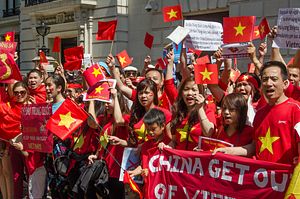On Monday, Vietnamese state-run newspapers highlighted two recent encounters between Vietnamese fishing boats and Chinese vessels in disputed water near the Paracel Islands. The Vietnamese fishermen claimed they had been “attacked and robbed” by Chinese vessels, according to Thanh Nien.
The Paracel Islands have been entirely occupied by China since 1974, when China drove the remaining South Vietnamese troops away in a battle. Vietnam continues to claim the islands, but China refuses to recognize that a dispute exists.
The media reports noted two separate clashes between Vietnamese fishermen and unspecified Chinese ships near the Paracels, in what Thanh Nien described as the fishermen’s “traditional fishing grounds.” In the first incident, on June 7, two Vietnamese fishermen said they were injured after a Chinese vessel fired water cannons at their boat. Bui Tan Doan, one of the injured fishermen, told Thanh Nien that the water cannon fire continued for two hours, flooding the boat. “We signaled the ship not to use water cannons any more but they continued to do so while we were bailing water out,” Doan said. He said his left leg was broken in the attack; a picture of him in a large cast accompanied the story.
In the second incident, on June 10, fishing boat captain Nguyen Van Phu claims he and his 10 crewmen were robbed by Chinese. Phu said four vessels surrounded his, and two speedboats carrying six Chinese came up to his boat. The Chinese then damaged his boat and removed equipment on board, including walkie-talkies and other electronics. “They also forced us to hand all the catch, weighing around six tons, to their vessels,” another crew member told the press.
The reports did not specify what kind of Chinese vessels confronted the Vietnamese ships – whether civilian vessels, such as rival fishing boats, or coast guard vessels. Earlier this year, the Philippines accused Chinese Coast Guard vessels of using water cannons on fishing boats near the Scarborough Shoal and seizing fish and equipment at gunpoint.
“Chinese fishing boats and coast guard ships have bullied Vietnamese fishermen operating in the area for decades. The harassment has become particularly pronounced in recent years,” Thanh Nien concluded.
The timing of the news reports is interesting as China and Vietnam will be holding a high-level bilateral meeting in Beijing from June 17-19. Pham Binh Minh, Vietnam’s deputy prime minister and foreign affairs minister, will travel to China to co-host the eighth meeting of the China-Vietnam Steering Committee for Bilateral Cooperation. The Chinese co-host is State Councilor Yang Jiechi.
Last June’s meeting of the Steering Committee, held in Hanoi, was overshadowed by the maritime disputes. Yang’s trip to Hanoi in mid-June 2014 made him the first high-ranking Chinese official to travel to Vietnam since China began operating an oil rig in waters Vietnam claims as part of its exclusive economic zone (EEZ). The meeting was testy, and apparently neither side was satisfied with it – though Yang’s visit in June 2014 was billed as “the annual China-Vietnam Steering Committee on Cooperation,” he returned to Hanoi again in October for what is now officially known as the seventh meeting of the China-Vietnam Steering Committee for Bilateral Cooperation. The October meeting was far more positive, with both sides smoothing over tensions with a promise to “control and manage their maritime differences.”
Writing for The Diplomat, Shawn Crispin outlines a schism in Vietnam’s leadership that complicates its response to the maritime disputes. One camp, led by Prime Minister Nguyen Tan Dung, seeks to pursue increased cooperation (especially military cooperation) with the United States to bolster Vietnam’s claims to disputed areas. The other camp, led by President Truong Tan Sang and Party Secretary Nguyen Phu Trong, places more of a premium on ties with China.

































